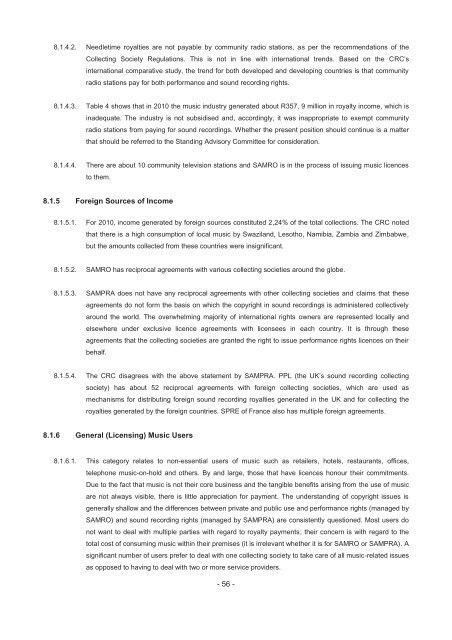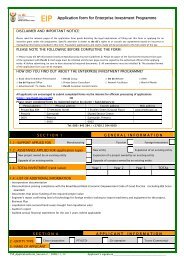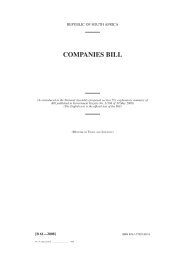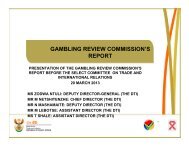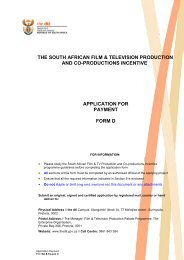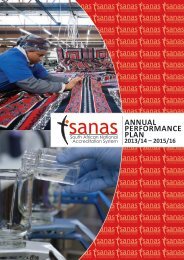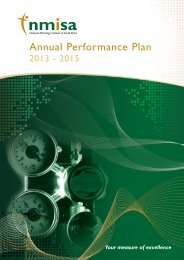Copyright Review Commission Report - ICT Law and Regulation ...
Copyright Review Commission Report - ICT Law and Regulation ...
Copyright Review Commission Report - ICT Law and Regulation ...
- No tags were found...
Create successful ePaper yourself
Turn your PDF publications into a flip-book with our unique Google optimized e-Paper software.
8.1.4.2. Needletime royalties are not payable by community radio stations, as per the recommendations of theCollecting Society <strong>Regulation</strong>s. This is not in line with international trends. Based on the CRC’sinternational comparative study, the trend for both developed <strong>and</strong> developing countries is that communityradio stations pay for both performance <strong>and</strong> sound recording rights.8.1.4.3. Table 4 shows that in 2010 the music industry generated about R357, 9 million in royalty income, which isinadequate. The industry is not subsidised <strong>and</strong>, accordingly, it was inappropriate to exempt communityradio stations from paying for sound recordings. Whether the present position should continue is a matterthat should be referred to the St<strong>and</strong>ing Advisory Committee for consideration.8.1.4.4. There are about 10 community television stations <strong>and</strong> SAMRO is in the process of issuing music licencesto them.8.1.5 Foreign Sources of Income8.1.5.1. For 2010, income generated by foreign sources constituted 2,24% of the total collections. The CRC notedthat there is a high consumption of local music by Swazil<strong>and</strong>, Lesotho, Namibia, Zambia <strong>and</strong> Zimbabwe,but the amounts collected from these countries were insignificant.8.1.5.2. SAMRO has reciprocal agreements with various collecting societies around the globe.8.1.5.3. SAMPRA does not have any reciprocal agreements with other collecting societies <strong>and</strong> claims that theseagreements do not form the basis on which the copyright in sound recordings is administered collectivelyaround the world. The overwhelming majority of international rights owners are represented locally <strong>and</strong>elsewhere under exclusive licence agreements with licensees in each country. It is through theseagreements that the collecting societies are granted the right to issue performance rights licences on theirbehalf.8.1.5.4. The CRC disagrees with the above statement by SAMPRA. PPL (the UK’s sound recording collectingsociety) has about 52 reciprocal agreements with foreign collecting societies, which are used asmechanisms for distributing foreign sound recording royalties generated in the UK <strong>and</strong> for collecting theroyalties generated by the foreign countries. SPRE of France also has multiple foreign agreements.8.1.6 General (Licensing) Music Users8.1.6.1. This category relates to non-essential users of music such as retailers, hotels, restaurants, offices,telephone music-on-hold <strong>and</strong> others. By <strong>and</strong> large, those that have licences honour their commitments.Due to the fact that music is not their core business <strong>and</strong> the tangible benefits arising from the use of musicare not always visible, there is little appreciation for payment. The underst<strong>and</strong>ing of copyright issues isgenerally shallow <strong>and</strong> the differences between private <strong>and</strong> public use <strong>and</strong> performance rights (managed bySAMRO) <strong>and</strong> sound recording rights (managed by SAMPRA) are consistently questioned. Most users donot want to deal with multiple parties with regard to royalty payments; their concern is with regard to thetotal cost of consuming music within their premises (it is irrelevant whether it is for SAMRO or SAMPRA). Asignificant number of users prefer to deal with one collecting society to take care of all music-related issuesas opposed to having to deal with two or more service providers.- 56 -


